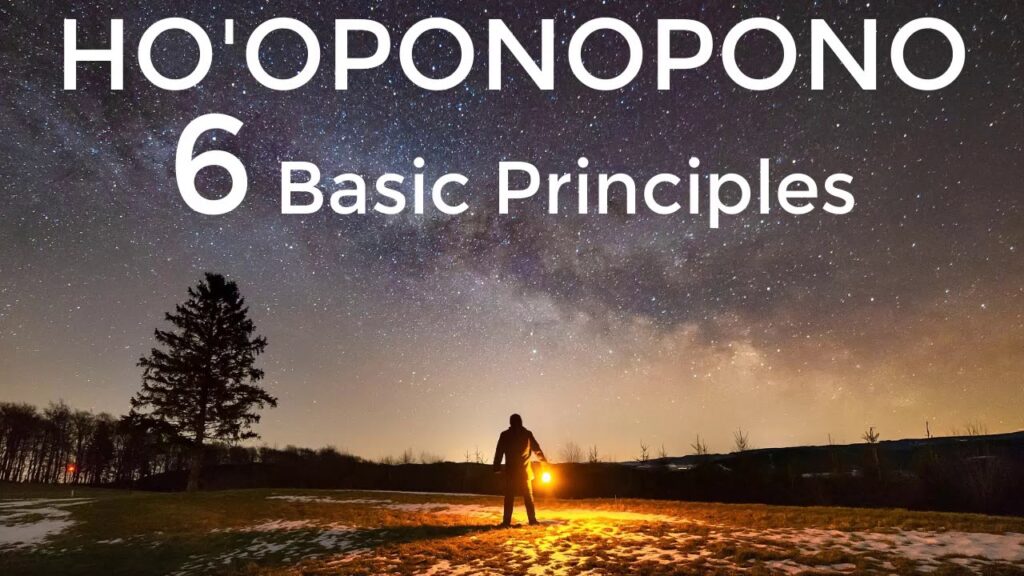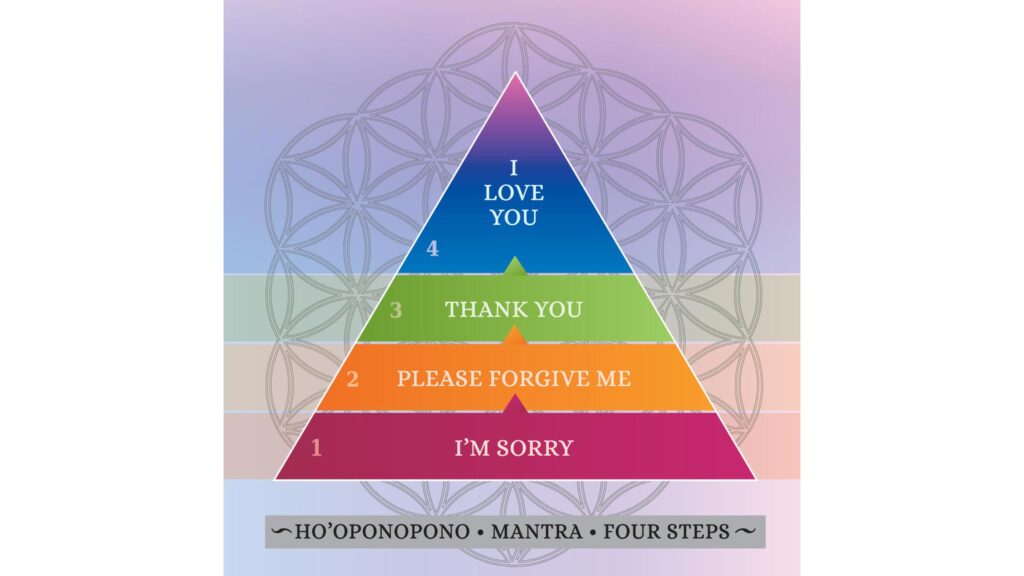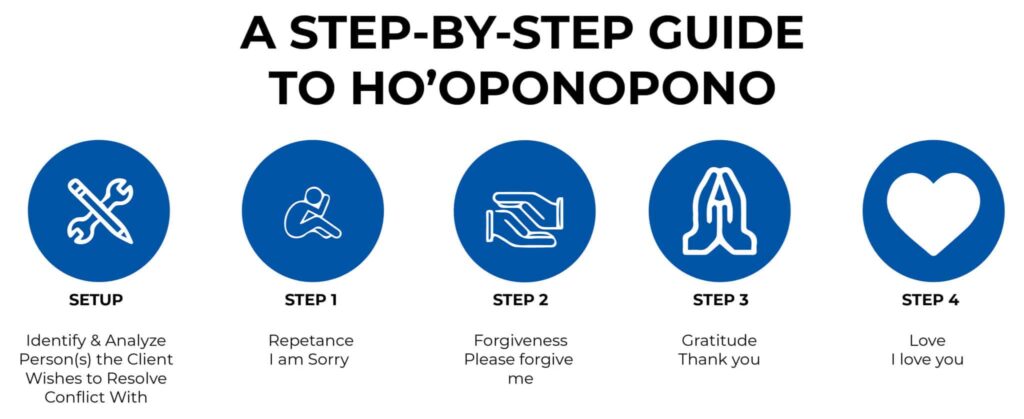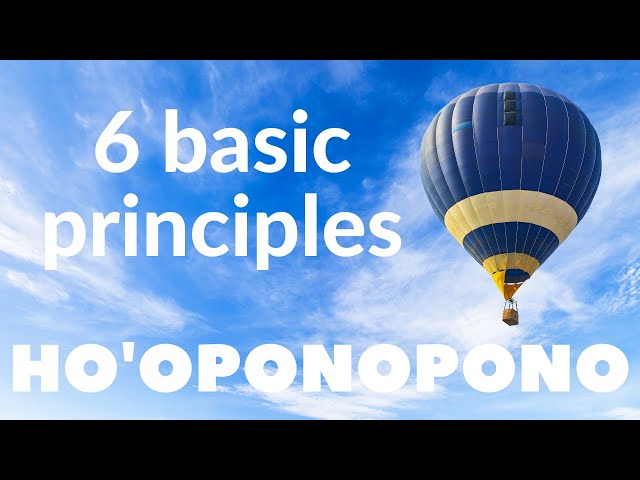Have you ever heard of Ho’oponopono? It’s a Hawaiian practice that focuses on forgiveness, healing, and reconciliation. In this article, we’ll dive into the basic principles of Ho’oponopono and how they can be applied to your own life. Whether you’re looking for a way to improve your relationships, release emotional baggage, or find inner peace, Ho’oponopono offers practical tools and techniques that can help you on your journey. So, let’s get started and explore the transformative power of this ancient Hawaiian wisdom.
Ho’oponopono is based on the belief that we are responsible for everything that comes into our lives. It teaches us that in order to heal ourselves, we must take responsibility for our actions, thoughts, and emotions. By owning up to our part in any situation, we can begin the process of forgiveness and ultimately, healing. Through this practice, we learn that forgiveness is not just about letting go of resentment towards others, but also about forgiving ourselves for any past mistakes or regrets.
One of the key principles of Ho’oponopono is the power of forgiveness. Ho’oponopono teaches us that holding onto grudges or harboring negative emotions only serves to harm ourselves. By forgiving others and ourselves, we can release the weight of the past and create space for healing and growth. Another principle is the belief in the interconnectedness of all things. Ho’oponopono teaches us that we are all connected and that by healing ourselves, we can also contribute to the healing of the world around us.
In the upcoming article, we will delve further into each principle of Ho’oponopono, exploring how they can be applied in practical ways to bring about positive change in our lives. Whether you’re navigating personal relationships, seeking emotional healing, or simply looking for a way to find more peace and happiness in your life, Ho’oponopono offers a powerful and accessible path towards transformation. So, stay tuned as we unravel the mysteries and explore the practical wisdom of Ho’oponopono. Ho’oponopono is a traditional Hawaiian practice that has gained popularity in recent years for its profound healing and transformative effects. Rooted in the indigenous beliefs and customs of the Hawaiian people, Ho’oponopono offers a holistic approach to resolving conflicts, restoring harmony, and cultivating inner peace. In this article, we will explore the eight basic principles of Ho’oponopono and their significance in personal growth and healing.
Understanding the Origins of Ho’oponopono
Before delving into the principles of Ho’oponopono, it is essential to understand its origins and cultural background. Ho’oponopono has its roots in the ancient Hawaiian tradition of resolving disputes and restoring balance within the community. Historically, it was practiced by Hawaiian elders and spiritual leaders to address conflicts, reconcile relationships, and promote emotional and spiritual healing.
Exploring the Meaning of Ho’oponopono
The word Ho’oponopono itself carries a deep meaning and encapsulates the essence of the practice. It is derived from the Hawaiian words “ho’o” meaning “to make” and “ponopono” meaning “right.” Together, they signify the intention to make things right, to restore harmony and balance in one’s relationships, emotions, and overall well-being. Ho’oponopono is not just a set of techniques; it is a way of life, a philosophy that guides individuals to take responsibility for their experiences and actively participate in their healing and growth.
Discovering the Cultural Significance of Ho’oponopono
Ho’oponopono holds immense cultural significance for the Hawaiian people. It reflects their deep connection to nature, their reverence for their ancestors and the spiritual world, and their belief in the interconnectedness of all beings. By practicing Ho’oponopono, individuals not only heal themselves but also honor the cultural heritage and wisdom of the Hawaiian people.

Principle 1: Taking Responsibility
The first principle of Ho’oponopono is taking responsibility for your own experiences. It involves recognizing that you are the creator of your reality and that your thoughts, actions, and reactions shape your life. This principle empowers individuals to accept accountability for their choices and the impact they have on themselves and others. By acknowledging and taking responsibility for their experiences, individuals become active participants in their healing journey.
Recognizing that You Are Responsible for Your Own Experiences
In Ho’oponopono, you are encouraged to understand that you are responsible for the way your life unfolds. It emphasizes the belief that you have the power to shape your reality through your thoughts, beliefs, and actions. This principle invites you to reflect on your choices and take ownership of your experiences.
Accepting Accountability for Your Thoughts, Actions, and Reactions
Ho’oponopono teaches the importance of taking ownership of your thoughts, actions, and reactions. It emphasizes that by consciously choosing positive thoughts, compassionate actions, and mindful responses, you can create a positive and harmonious life. This principle encourages self-reflection and self-awareness, enabling you to take control of your emotional well-being.
Principle 2: Forgiveness
Forgiveness is a core principle in Ho’oponopono. It acknowledges the transformative power of forgiveness in healing relationships, releasing emotional burdens, and cultivating inner peace. By embracing forgiveness, individuals can let go of resentments and grudges, allowing for deep healing and reconciliation.
Understanding the Importance of Forgiveness in Ho’oponopono
Ho’oponopono recognizes that holding onto grudges and harboring resentment can be detrimental to one’s emotional well-being. By practicing forgiveness, individuals can free themselves from the negative emotions and baggage that weigh them down. Forgiveness is seen as an act of self-compassion and liberation, empowering individuals to move forward with an open heart.
Practicing Forgiveness Towards Oneself and Others
In Ho’oponopono, forgiveness is not limited to forgiving others; it also encompasses self-forgiveness. Individuals are encouraged to forgive themselves for past mistakes, regrets, and self-judgment. This act of self-compassion allows for self-growth and creates space for healing and transformation.
Releasing Resentments and Grudges Through Forgiveness
Ho’oponopono teaches individuals to release resentments and grudges through forgiveness. By letting go of negative emotions, individuals can experience emotional freedom and cultivate healthier relationships. Forgiveness is seen as a powerful tool for resolving conflicts and restoring harmony both within oneself and with others.
Principle 3: Gratitude
Gratitude is a fundamental principle of Ho’oponopono, emphasizing the importance of cultivating a mindset of appreciation and thankfulness. By embracing gratitude, individuals can attract positivity, elevate their vibration, and experience profound shifts in their perception and overall well-being.
Cultivating a Mindset of Gratitude in Ho’oponopono
Ho’oponopono encourages individuals to cultivate a mindset of gratitude by acknowledging and appreciating the blessings in their lives. This practice involves consciously shifting one’s focus from what is lacking to what is present, nurturing a sense of abundance and contentment.
Expressing Gratitude for the Blessings and Lessons in Life
In Ho’oponopono, individuals are encouraged to express gratitude for both the blessings and the lessons in life. By recognizing the value of both positive and challenging experiences, individuals can find meaning and purpose in their journey.
Harnessing the Power of Gratitude to Attract Positivity
Gratitude is not just a state of mind; it is a powerful force that can attract positivity and abundance into one’s life. By embracing gratitude, individuals can elevate their vibration and energetically align themselves with positive opportunities and experiences.
Principle 4: Connection
The principle of connection is deeply ingrained in Ho’oponopono, highlighting the interconnectedness of all beings and the recognition of a higher power or divine energy. By fostering deeper connections with oneself, others, and the universe, individuals can experience a sense of unity and oneness.
Recognizing the Interconnectedness of All Beings
Ho’oponopono teaches individuals to recognize the interconnectedness of all beings. It emphasizes that we are all connected energetically and that our thoughts, words, and actions have a ripple effect that extends beyond ourselves.
Acknowledging the Presence of a Higher Power or Divine Energy
In Ho’oponopono, individuals are encouraged to acknowledge the presence of a higher power or divine energy. This acknowledgement fosters a sense of humility, surrender, and trust in the greater wisdom and guidance of the universe.
Fostering Deeper Connections with Oneself, Others, and the Universe
Ho’oponopono empowers individuals to foster deeper connections with themselves, others, and the universe. By cultivating self-awareness, practicing empathy, and embracing the interconnectedness of all beings, individuals can experience a profound sense of unity and love.

Principle 5: Letting Go
Letting go is a crucial principle in Ho’oponopono, emphasizing the art of surrender and detaching from outcomes. By releasing attachments and control, individuals can find inner peace, harmony, and the ability to embrace the natural flow of life.
Releasing Attachments and Expectations Through Detachment
Ho’oponopono teaches individuals to release attachments and expectations through detachment. This principle invites individuals to surrender the need to control outcomes and trust in the natural unfolding of life.
Embracing the Art of Surrender and Letting Things Unfold Naturally
Letting go involves embracing the art of surrender and allowing things to unfold naturally. By relinquishing the need to control every aspect of life, individuals can experience a sense of freedom, ease, and serenity.
Finding Inner Peace and Harmony by Letting Go of Control
Letting go of control enables individuals to find inner peace and harmony. By trusting in the process of life and embracing the unknown, individuals open themselves up to endless possibilities and experiences.
Principle 6: Healing
Healing is at the core of Ho’oponopono, serving as a powerful tool for emotional and spiritual well-being. By using Ho’oponopono as a practice for clearing energetic blockages, releasing negative emotions, and promoting self-healing, individuals can experience profound transformation and inner peace.
Using Ho’oponopono as a Tool for Emotional and Spiritual Healing
Ho’oponopono offers individuals a practical tool for emotional and spiritual healing. By engaging in the practice of forgiveness, gratitude, and letting go, individuals can release emotional blockages, heal past wounds, and experience a deep sense of liberation.
Clearing Energetic Blockages and Releasing Negative Emotions
Ho’oponopono recognizes that unresolved emotions and energetic blockages can hinder one’s well-being. By actively engaging in the practice, individuals can release negative emotions, clear energetic blockages, and create space for positive energy and healing.
Promoting Self-Healing and Inner Transformation
Ho’oponopono empowers individuals to take charge of their healing journey. By practicing self-forgiveness, expressing gratitude, and nurturing a healthy relationship with oneself, individuals can promote self-healing and initiate inner transformation.

Principle 7: Self-Love
Self-love is a foundational principle in Ho’oponopono, emphasizing the significance of self-compassion, self-acceptance, and self-care. By nurturing a healthy relationship with oneself, individuals can experience deeper love, respect, and fulfillment.
Understanding the Significance of Self-Love in Ho’oponopono
Ho’oponopono emphasizes that self-love is not selfish or narcissistic; rather, it is a vital aspect of personal growth and well-being. It underscores the importance of valuing oneself, setting healthy boundaries, and embracing self-care.
Practicing Self-Compassion, Self-Acceptance, and Self-Care
In Ho’oponopono, individuals are encouraged to practice self-compassion, self-acceptance, and self-care. This involves treating oneself with kindness, accepting one’s strengths and imperfections, and prioritizing one’s physical, emotional, and spiritual needs.
Nurturing a Healthy Relationship with Oneself
Ho’oponopono teaches individuals the importance of nurturing a healthy relationship with oneself. By cultivating self-awareness, practicing self-reflection, and engaging in self-healing practices, individuals can experience a deep sense of self-love and fulfillment.
Principle 8: Mindfulness
Mindfulness is a foundational aspect of Ho’oponopono, emphasizing the practice of being fully present in the moment. By cultivating a state of mindful awareness of one’s thoughts, feelings, and sensations, individuals can experience a profound sense of peace and clarity.
Being Fully Present in the Moment
Ho’oponopono emphasizes the power of being fully present in the moment. By letting go of the past and the future, individuals can experience a deeper connection with themselves and their surroundings.
Practicing Mindful Awareness of Thoughts, Feelings, and Sensations
In Ho’oponopono, individuals are encouraged to practice mindful awareness of their thoughts, feelings, and sensations. By observing their inner experiences without judgment or attachment, individuals can cultivate a state of mindfulness and develop a deeper understanding of themselves.
Cultivating a State of Mindfulness in Everyday Life
Ho’oponopono teaches individuals to integrate mindfulness into their everyday lives. By bringing mindful awareness to their actions, interactions, and choices, individuals can experience a greater sense of peace, clarity, and fulfillment.

Conclusion
In conclusion, Ho’oponopono offers a profound path to personal growth, healing, and spiritual transformation. The eight basic principles of Ho’oponopono – taking responsibility, forgiveness, gratitude, connection, letting go, healing, self-love, and mindfulness – provide individuals with a roadmap to navigate life’s challenges and cultivate deep inner peace. By embracing these principles, individuals can embark on a journey of self-discovery, healing, and ultimately, harmonious coexistence with oneself, others, and the universe. So why not start implementing these principles in your own life today? You have the power to make things right and create a life of peace, love, and abundance.
